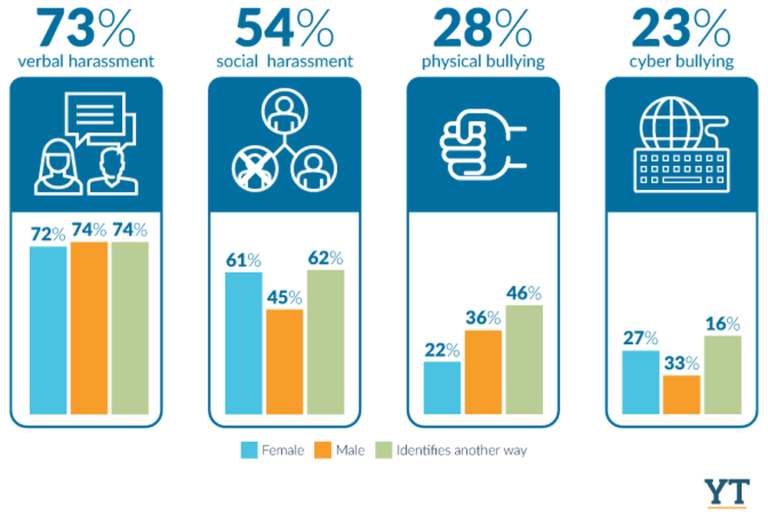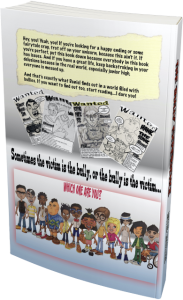What Are Some Good Comebacks For Bullies?


By Antoine G Larosiliere
As I sit here waiting for the Yankees game to start; I started thinking about a question many parents and students have asked me in the past, and It’s a question I’ve even asked myself; What are some good comebacks for bullies?
As a parent and a teacher, there’s a feeling of helplessness we get when our children or our students ask us for help. The right words or the right comebacks don’t come to mind. This has happened to me and other parents as well when a child asks, “what are some good comebacks for bullies?” Wouldn’t it be great if you knew percisely what to say? Or, if you had a toolbag of effective comebacks at your disposal? Well, after many failed attempts at providing effective comebacks, I will share with you what has worked and what will truly help your child. To answer the question “what are some good comebacks for bullies?” The answer is, the comebacks that don’t qualify as insults, because in most cases insults agitate the situation. Comebacks that are either neutral or positive are the most effective, because they reverse the imbalance of power .
“When a bully teases, makes fun of or make inappropriate comments, it is because they are trying to control how we feel, or our actions.”
They are trying to control how we feel
Bullying is defined as an unwanted, aggressive often repeated behavior that involves an imbalance of power. It is important to define it so we can focus on the imbalance of power part of the definition. When a bully teases, makes fun of or makes inappropriate comments, it is because they are trying to control how we feel, or our actions. That control over us is the “imbalance of power” that exists. There are quite a few ways to reverse this “imbalance of power.” Some strategies or responses have negative in nature and don’t have a long-term healthy impact. That is why I would strongly suggest anyone to not engage in physical violence, insults, or the reciprocation of any abuse as a response.

Insults don’t work
Since this article focuses on answering the question “what are some good comebacks for bullies,” let’s take a closer look to understand why insults don’t work. Dictionary.com defines comebacks as “a clever or effective retort.” Merriam-Webster defines comebacks as “a sharp or witty reply.” Neither one of those definitions imply insults or any form of an abusive response. Insults are a form of abuse and in most cases agitate the situation. If you insult or hurt the bullies feelings, he is likely to become even more aggressive towards you. If the insult repels them away, they often turn their abuse to someone else or try to hurt themselves. Many of us rather not have that on our conscious.
Your child needs to understand that the bully is often a victim of abuse
Reversing the imbalance of power unfortunately isn’t as easy as it may seem. What we are essentially doing is asking a child who more than likely struggles with low-self esteem or low self confidence to take back control from the bully. It is difficult for a child like that to execute because often they blame themselves for being bullied. They also are likely to believe the insults or the verbal abuse being spewed by the bully. That is why the first thing that needs to be addressed before we assemble an effective set of responses; is getting your child to understand why the bullying is happening. The child needs to be educated on the general make-up or profile of a “bully.” Your child needs to understand that the bully is often a victim of abuse and that they are only doing what they were taught. Your child might say to that, “Well why did they choose me to abuse?” Your answer to that question should be, “Because they think it’s easier to control your feelings than someone else’s.” Then follow that with, But we’re going to prove them wrong.
A “comeback” may, or may not be necessary
Once your child understands why the bully is behaving this way towards them, a comeback may or may, not be necessary. If a bully’s goal is to control your feelings or actions; to reverse this control you must act opposite of what they expect. If your non verbal reactions are effective, you may not need a verbal response. If the bully expects you to get upset, don’t! Show no reaction. Even better than that, if you react pleasant or happy; they will see their words have no ill effects on you and will likely change their course of action. If he/she continues to verbally abuse you, at that point your child might need to reinforce their non verbal reactions with a few very effective comebacks.
Comebacks should either be neutral, or positive
The preferred “comebacks” should either be neutral, or positive. A neutral comeback conveys no emotion. Since the bully expects your child to get upset, the neutral comeback thwarts the bullies expectations. To reverse this imbalance of power even further, your child can give a positive comeback or response. The positive comeback is even more discouraging to the bully because it makes the bully feel their attempts are counter-productive. Below several common examples of name calling followed by both a neutral comeback and a positive comeback.
“I hate you”
Neutral–That’s ok I’m an acquired taste.
Positive– Well, I think you’re awesome.
“That’s why you have no friends”
Neutral– Excuse me, you must think I care.
Or, “If you’re waiting for me to start to care, I hope you brought something for eating, because it’s gonna be a long time.”
Positive–You’re my friend, you just don’t know it yet.
“What are you looking at”
Neutral–When I figure it out, I will let you know.
Positive–I was checking you out, God must have blessed you.
“Loser”
Neutral–Thank you, now I know who’s in charge of deciding who’s a loser and who is not! Or, I’ve been called worse.
Positive–Not everyone can be a winner like you.
“Nerd”
Neutral– Can you be a little more original next time
Positive–I prefer intellectual badass.
“Stupid”
Neutral–Wow! Did you come up with that on your own? You feel better now that you got that off your chest.
Or, “remember when I asked for your opinion? Me neither.
Positive–Well, I think you’re brilliant.
You can also visit ishoudhavesaid.net for more responses to verbal bullying. I hope this has been helpful! Many strategies including the one I just mentioned can also be found in the novel The Bully Experience: Daniel’s Story. Also subscribe to the YouTube channel for more insight to these topics.
The Bully Experience "Daniel's Story"

Sign up for our newsletter and Read the novel For Free!
Stay updated. Sign up for our newsletter, and get the first two chapters of The Bully Experience Daniel’s Story absolutely free.